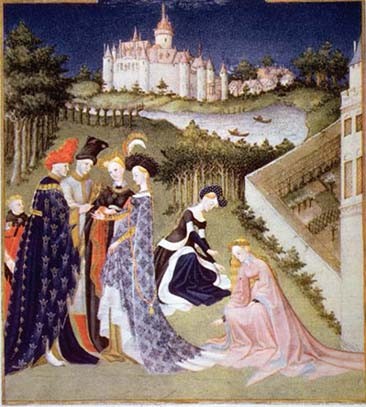 |
The 1,000-year interval between antiquity and the renaissance is sometimes called the “Middle Ages,” presumably because it happened in the “middle” of those two eras (thus making a history sandwich.) It’s also known as the “Dark Ages,” partly due to a popular perception that its people were wont to spent their time smiting each other (true) to the exclusion of all other recreation (not true.)
Properly, this is the medieval period, and it was killer. Viking raids! The Plague! Crusades! King Arthur! (Maybe.)¬ÝYet the prejudice against this misrepresented epoch is rampant: even current fans are reformed doubters.¬Ý
“I avoided medieval literature when I did my undergrad,” admits Dal English professor (and surprise medievalist) Kathy Cawsey. “I was forced into it in my fourth year.”
Dr. Cawsey has not merely reconsidered her feelings on the subject since then – she’s gone on to publish papers and teach classes, dedicated to medieval literature. And three years ago, Dr. Cawsey (along with St. FX’s Donna Trembinski and Cory Rushton) co-founded the Atlantic Medieval Association. The association functions partly as a hub for medievalists at Atlantic universities, since many work at schools without medieval studies departments.
‚ÄúWe were a bit concerned... that we would feel a bit cut off,‚Äù Dr. Cawsey says. The AMA unites ‚ÄúAtlantic‚Äù medievalists ‚Äì perhaps a misleading term in turn, since¬Ý members hail from as far away as Glasgow, Scotland. In the words of Dal professor Michael Fournier, this is ‚ÄúAtlantic, very broadly conceived.‚Äù
The association also holds an annual conference - this year‚Äôs runs September 24 and 25 - and, for the first time, it‚Äôs being hosted by ¬È∂π¥´√Ω. Dr. Fournier, an AMA member, was the lead organizer.¬Ý Nearly a dozen professors from ¬È∂π¥´√Ω and the University of King‚Äôs College will join forces with visiting academics, presenting papers with such juicy subjects as ‚ÄúAssassins and Suicides in Dante‚Äôs inferno‚Äù (King‚Äôs‚Äô Dr. Thomas Curran‚Äôs offering.)
Topics include everything from history to music to archaeology. “There are papers which cover the range, philosophy to literature... It covers a lot of different interests and approaches,” says Dr. Fournier. The keynote speaker will be Dr. Stephen Gersh of the University of Notre Dame, presenting a paper entitled “Hellenism in 15th Century Philosophy: Two Case-Studies (Nicholas of Cusa and Marsilio Ficino.)”
Dr. Fournier himself will present ‚ÄúPlanudes Reading Boethius Reading Euripedes.‚Äù ‚ÄúI‚Äôll be going out of my usual area, in a way,‚Äù Dr. Fournier says. ‚ÄúI‚Äôm giving a paper on a Greek translation of a Latin text.‚Äù But it‚Äôll be a reunion of sorts with Boethius, the medieval Christian philosopher (bloodily executed, if that sort of thing interests you) on whom Dr. Fournier composed his PhD dissertation. Before the AMA conference, Dr. Fournier will take the paper for a trial spin at a conference in the Czech Republic (his return to ¬È∂π¥´√Ω Thursday nets him mere hours of downtime between the two gatherings.)
Aside from Dr. Fournier’s European detour, the AMA’s meeting should be quite straight-forward. “While we’ve expanded the size of the conference itself... we’ve kept things simple,” says Dr. Fournier. “I’m encouraging undergraduates to come... the sessions for the most part are short, so it’s easy to come and go.”
The talks are “absolutely free” (though people attending a significant percentage are asked to join the Atlantic Medieval Association.)
Escaping labels like the “Dark Ages” may be a daunting task (after all, we’ve called it that for centuries) but Dr. Cawsey thinks popular interest in the medieval period may be on the upswing.
“It seems to go in waves,” she says. “There seems to be a resurgence in the popular culture... certainly there seems to be a new Beowulf movie every two years.” But 2007’s Beowulf had Neil Gaiman’s magic touch – so maybe, when the right people are involved, popularity can be parlayed into lasting prominence.
